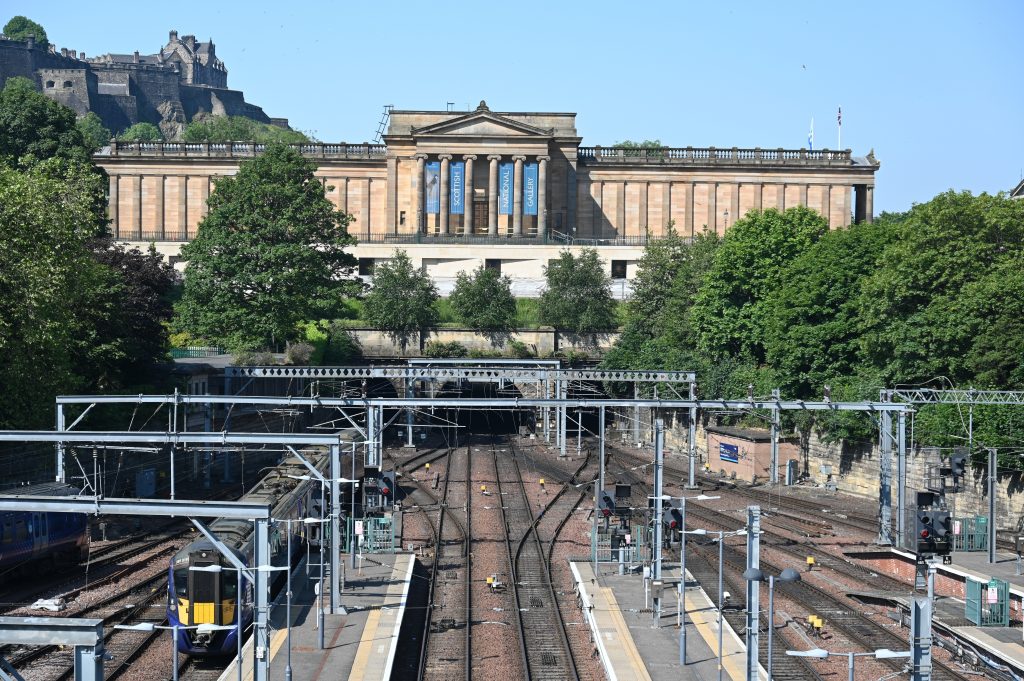At Edinburgh Waverley Station, presenter Kate Humble helped unveil a unique pop-up initiative designed to encourage sustainable travel. The innovative ‘Our Planet Can’t Wait-ing Room’ is an educational experience created by London North Eastern Railway (LNER) to raise awareness about the environmental impact of travel and to promote greener choices. This initiative follows research which revealed a significant lack of understanding about carbon terminology among Scots, with nearly a third of respondents admitting they struggle with the complex language used in climate conversations.
The survey, commissioned by LNER, highlighted that terms such as ‘carbon pricing’, ‘carbon budget’, and ‘carbon accounting’ cause considerable confusion. A notable 28% of those surveyed confessed to bluffing their way through environmental discussions to avoid asking for clarification. Additionally, 23% admitted they never consider the environmental impact of their travel, while 62% were unaware of how to compare emissions across different modes of transport, such as planes, trains, and cars.
However, despite these gaps in understanding, the research found that over a quarter (29%) of Scots would be likely to change their holiday planning if they believed it would benefit the environment. This indicates that better education about carbon emissions could lead to more sustainable travel choices.
In response to these findings, LNER’s one-day pop-up waiting room aimed to address these knowledge gaps. Open at Edinburgh Waverley Station, the event offered visitors a glimpse into some of the cutting-edge environmental initiatives being trialled by LNER and its partners.
Kate Humble, well-known for her work on environmental and wildlife programmes, led the launch of the experience as LNER’s ‘Carbon Saving Conductor’. She participated in a range of activities, including a plant-a-thon with local schoolchildren, and shared tips for travelling more sustainably.
Speaking from the station, Humble emphasised the importance of raising awareness around sustainability: “It’s so important we all do our bit to take steps to minimise our impact on the environment. But it’s really hard to do that when you don’t understand all the jargon that people use when talking about carbon and emissions.”
She added: “Being armed with the facts is the first step we can take in being more sustainable. This experience is a fantastic way to raise awareness of the effect of our travel choices on the environment and to share more information about what you can do to be more sustainable – especially for kids.”
The waiting room experience offered visitors a variety of hands-on activities. These included learning about algae technology being trialled at Berwick-upon-Tweed station to purify the air, and a 3D printing demonstration showing how plastic waste can be transformed into useful products. Guests were also invited to participate in a ‘pick ’n’ mix seed wall’ and the plant-a-thon, which was designed to engage children in a fun, environmentally conscious activity.
At the heart of the exhibition was LNER’s ‘Carbon Saving Departures Board’, a traditional split-flap travel information board with a modern twist. Surrounded by native Scottish plants and flowers, the board illustrated the emissions passengers save by choosing to travel with LNER. It equated the savings to everyday objects and landmarks, making the information easier to understand. For instance, on a typical day, passengers travelling south from Edinburgh with LNER save a cumulative 518,123 kg of CO₂ emissions, which is the equivalent of filling 113 Olympic swimming pools or the weight of 1,151 Highland cows.
Warrick Dent, Responsible Business Chair at LNER, highlighted the company’s commitment to sustainability. “We brought our Carbon Saving Departures Board to Edinburgh after our research revealed people in Scotland are eager to learn more about carbon emissions and how to be more sustainable,” he said. Dent noted LNER’s ambition to become the most environmentally responsible travel option for future generations, stressing that companies like LNER have a responsibility to make it easier for people to grasp the environmental impact of their choices.
The launch comes during one of the busiest travel periods for LNER, as Edinburgh welcomes a large influx of visitors for the annual Fringe Festival. Last year, LNER transported more than 140,000 passengers between Edinburgh and London King’s Cross during the festival. By promoting greener travel options, LNER hopes to build on this success while contributing to a more sustainable future.
As Kate Humble concluded: “Educating [people] when they’re young gives us the best possible chance of enjoying our amazing planet for generations to come.”


